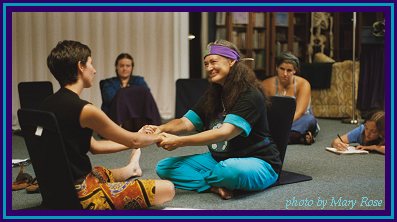Herbal Medicine the Wise Woman Way, Part 1
5 Section class with Susun Weed
Section 1: Fertility and Infertility (published fall 2002)Required texts:
Healing Wise (Susun Weed Ash Tree Publishing )
Wild Woman's Garden (Jillian VanNostrand, Radical Weeds Press )
Suggested texts:
Wise Woman Herbal for the Childbearing Year (Susun Weed, Ash Tree Publishing )
Menopausal Years, the Wise Woman Way (Susun Weed, Ash Tree Publishing )
Breast Cancer? Breast Health! The Wise Woman Way (Susun Weed, Ash Tree Publishing )
Herbal Healing for Women (Rosemary Gladstar)
YET TO BE PUBLISHED:
Section 2: PMS, PMDD, Menstrual Problems (winter 2002)
Section 3: Pregnancy (spring 2003)
Section 4: Menopause (summer 2003)
Section 5: Healthy Breasts (fall 2003)
Section 1: Fertility and Infertility
Promoting Fertility
Red Clover Blossoms * Trifolium pratense
Decreasing Fertility
Wild Carrot Seed * Daucus carota
Wild Yam Root * Dioscorea villosa
--------------------------------------------------------------------------------
Welcome to my virtual moon lodge. This is a place where women of all ages gather to share wisdom. Close your eyes for a moment. Breathe in and remember yourself and your power.
The moon lodge is women's sacred space. It is said that women journey "between the worlds" when they bleed. That is, their consciousness is altered, and they have special powers, among them the ability to talk to plants, and to learn from them how they are to be used.
For many moons I have sat in the moon lodge listening to the wisdom of women. For many moons I have sat in the meadows and on mountain ledges listening to the wisdom of the plants. Gathering this wisdom into my heart, I spin it out to your through my throat, my fingers, my eyes, my brain, and into your eyes, your brain, through your fingers, perhaps even into your heart. This weeks wisdom concerns fertility, and its shadow, infertility. Shall we begin?
Promoting Fertility
The reasons for infertility are complex and differ greatly form woman to woman and from couple to couple. About half of the time, infertility is due to weak sperm; the other half of the time, the cause is blocked fallopian tubes, hormonal disruption, allergies to sperm (no kidding), plain old tension.
Despite these complexities, many couples find it easy and straightforward to establish a pregnancy with the help of herbs and a few easy lifestyle tricks. Remember that infertility needs to be addressed by both parents-to-be. A pregnancy may be forthcoming if only the woman changes and if only she eats well and if only shes uses herbal supports. But it is more certain (and birth defects less likely) if he uses them too.Some of the best fertility herbs in the world are common plants of North America: stinging nettle, red raspberry leaves (both in lesson 3), oatstraw (lesson 4 ), red clover and wild yam roots. Consistent use of one or more of these nourishing herbs, taken as an infusion , plus darkening your bedroom and keeping him out of hot water is the Wise Woman Way to parenthood.
Red clover blossom infusion is one of the world's best remedies for infertility, no matter what the cause. It nourishes the health of both eggs and sperm, opens blocked fallopian tubes, adjusts hormones, and generally makes the entire body more receptive to pregnancy. It is also highly regarded as an anti-cancer remedy. It is considered safe for consumption by pregnant and lactating women.
The high vitamin content of red clover blossoms, combined with the folic acid in the leaves is especially helpful to sperm and egg production and helps prevent birth defects.
Red clover's high mineral and trace mineral content helps restore and maintain good production of hormones. Its profuse and exceedingly absorbable calcium and magnesium help rejuvenate and repair the delicate tissues of reproduction.
And red clover's well-known ability to alkalinize the body may alter the vaginal pH, making it more receptive to sperm, and may create an environment more friendly to sperm throughout the woman's reproductive area, thus increasing the chances of conception. Consistent use softens scar tissue in the fallopian tubes.
Adding some dried peppermint leaves when brewing the red clover infusion makes it taste better, but watch out -- most mints are sexual stimulants.
Capsules, tinctures, and other ready-made forms of red clover won't help at all in my experience. To get the fertility-enhancing benefits of red clover, you'll need to make an infusion for yourself each night.Instructions for making red clover infusion.
You will need a quart canning jar, an ounce of herb by weight, and a kettle big enough to boil at least a quart of water. Put the dried herb into the jar. It will fill it about 1/3 full. Pour the boiling water over the dried herb, filling the jar. Cover tightly and steep four hours or overnight. Strain out the herbal material. Drink the remaining liquid at room temperature, over ice, or heated up. Be sure to use dried clover blossoms; fresh ones don't infuse well. The usual dose is one to four cups of infusion daily for 12-18 months.Turn down the heat. Sperm are ever so delicate. They are easily killed by heat. Keep those baby makers cool: no hot tubs, hot baths, tight pants, or tight underwear. Conversely, if you don't want to get pregnant, enjoy a hot (!!) tub every night for six weeks with your sweetheart and he'll be "shooting blanks" for 3-6 months.
Turn out the lights. Ovulation is triggered by a regular pattern of dark night interrupted by three nights of light (the full moon). When there is always light shining during the night the hormonal system gets confused. Correct this and fertility is increased dramatically. You have to make your bedroom really, really dark. No lit-up clocks, dark curtains, a rag under the door, whatever it takes to make it dark. Sleep like that for two weeks, then trigger ovulation by sleeping with a night-light on for three nights (Don't forget to make love with your partner; this is the best time.) Then sleep in the total dark again for two weeks plus another two weeks (a month total) before you trigger ovulation again by sleeping with a light on for three nights. This can be continued for as long as you like.
Decreasing Fertility
The wise women of old know all the secrets of conception and contraception. Those who wished to avoid pregnancy, may have used used wild carrot seed, or wild yam root.
Wild carrot (Daucus carota), better known as Queen Anne's lace, is such a common roadside plant that most people are amazed to learn that it is a proven anti-fertility herb. In addition to being the wild cousin of carrot, it is related to parsley, dill, caraway, anise, celery, cumin, and a (now extinct) plant whose seeds were the birth-control of choice for many a classical Greek or Roman woman.
The aromatic seeds of wild carrot are collected in the fall and eaten (a heaping teaspoonful a day) to prevent the implantation of a fertilized egg. In one small study the effectiveness rate after thirteen months of use was 99%. As modern scientific medicine reports that one-third of all fertilized eggs are passed out of the body without implanting in the uterus, this method of birth control seems in complete agreement with nature.
Of the hundreds of women currently using this anti-fertility agent, I have heard virtually no reports of any side-effects. Note that many books caution you to beware the danger of confusing poison hemlock and wild carrot. Wild carrot leaves have small hairs on them, while the leaves of poison hemlock are smooth.
Wild yam (Dioscorea villosa) is another anti-fertility herb that has been tested by small groups of modern women. Since birth-control pills were originally made from this plant, it is not at all surprising that it has the effect of blocking conception when taken daily in rather large doses: either a cup of tea or two capsules taken three times a day. Does it have detrimental effects? Current studies are too small to show any, but there is a possibility that there could be.
Wild yam contains diosigenin, used as a source material for pharmaceutical cortisone and progesterone, including that used in so-called "natural" pregesterone creams. There isn't any progesterone or cortisone in the plant; a long laboratory process creates them, and they are far from natural.
When consumed orally, three capsules three times a day or a cup of tea twice a day, the diosigenin may be converted into progesterone in a woman's body, thus decreasing the possibility of conception. There is no scientific validation of the idea that creams made from wild yam have any beneficial effect on health. In fact, it is impossible for plant hormones to be absorded by human skin.
Interestingly enough, if wild yam is taken is small doses (a cup of tea or 10-20 drops of the tincture) for two weks only -- from onset of menses until mid-period or ovulation -- it increases fertility! The diosigenin seems to be converted into LH and FSH, hormones which are needed to make the egg ready to be fertilized.
The earth is full of wonders, and green magic abounds. As more and more women remember that they are wise women, more of the wonders and the magic will be revealed. May your days be filled with many green blessings. (For further information on herbs and fertility, including herbs to avoid while pregnant, see Wise Woman Herbal for the Childbearing Year, Susun Weed, Ash Tree Publishing, 1986)
--------------------------------------------------------------------------------
Quiz 1.
(1) To resolve infertility
a. the woman needs to do something
b. the man needs to do something
c. both partners need to do something
d. herbs cannot help(2) Herbs that promote fertility
a. are rare
b. grow far away
c. taste bad
d. none of the above(3) Which of the following promote fertility?
a. stinging nettle
b. oatstraw
c. raspberry leaf
d. all of the above(4) Red clover is best used as a
a. tincture
b. infusion
c. capsule
d. vinegar(5) Red clover can
a. counter cancer
b. promote fertility
c. decrease birth defects
d. all of the above(6) Light at night has
a. No effect on fertility
b. A powerful effect on hormone production
c. A strong effect on dreams
d. None of the above( 7) Wild carrot is also known as
a. Queen Anne's Lace
b. Daucus carota
c. a weed
d. All of the above(8) Wild carrot and poison hemlock both have
a. white flowers
b. hairy leaves
c. aromatic seeds
d. purple splotches on the leaf bases and stalks(9) To prevent pregnancy you can
a. Eat a teaspoon of wild carrot seed a day
b. Drink lots of wild yam tea
c. Put your sweetheart in hot water
d. All of the above(10) Wild yam root is used as a source material for
a. Cortisone
b. Progesterone
c. Birth control pills
d. All of the above(11) The botanical name of wild yam is
a. Daucus carota
b. Dioscorea villosa
c. Digitalis purpurea
d. None of the aboveQuiz Answers (1) c, (2) d, (3) d, (4) b, (5) d, ( 6) b, (7) d, (8) a, (9) d, (10) d, (11) b
Study with Susun via a correspondence course!
This year, Susun is offering a special 7-month wise woman plan - Learn More by clicking here
Go to: Be Your Own Herbal Expert, Susun's other Free Correspondence Course
Note: close this window to return to where you came from.

